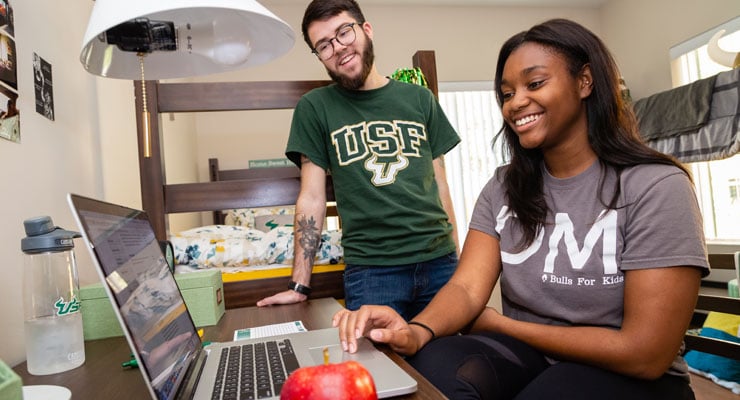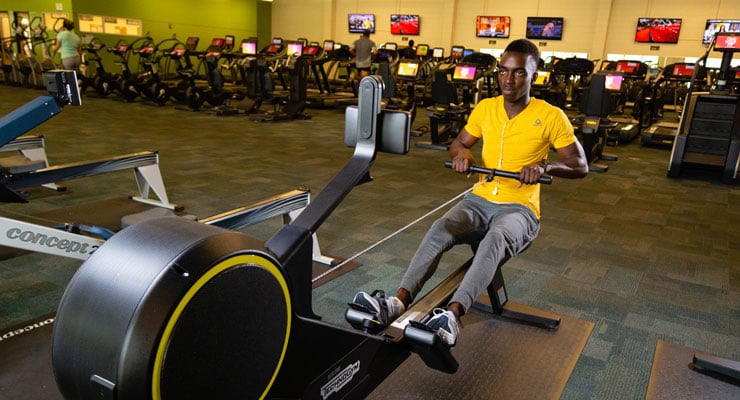10 Life Skills Every College Student Needs to Know
By Emily Young | Last Updated: Mar 5, 2025

You versus Life.
Sometimes it feels like an epic video game. You conquer everyday tasks (like making your bed) only to face down even bigger obstacles (like making new friends). As with most video games, the challenges get harder the further you advance. To conquer college, you’ll need a powerful skill set. We can help you level-up your abilities and master the 10 life skills every college student needs to know.
Let’s start playing.

Level One
Welcome to the introductory level, where you’ll focus on daily life tasks and healthy habits for college students. Your special skill: Adaptability. Your goal: Conquer this level and move on to the next.
Challenge Four: Keep a Clean Space
Cleaning may not be the most exciting task, but it's essential to adult life. Get ready to master the basics:
- Launder clothes (sadly, buying new underwear once a month doesn’t count).
- Wash your sheets.
- Wash your cloth facemask after each use.
- Scrub a bathroom.
- Clean a kitchen.
- Tidy up your bedroom.
- Disinfect frequently touched surfaces, such as countertops and door handles, once a day.
Try the two-minute rule: If it takes you two minutes or less to accomplish a task, get it done now. Throw trash away immediately instead of letting it pile up, and do the dishes after every meal. This simple rule will save you in-depth cleaning later.
Challenge Three: Cook for Yourself
Let’s tackle your next opponent: Cooking. Try to master everything that goes into a meal:
- Grocery shopping. Curbside pickup or delivery service can help you practice social distancing. If you go to the store yourself, remember to wear a face mask to protect other shoppers.
- Meal prep. If you have a busy schedule, cook dinner Sunday night and freeze leftovers for the rest of the week.
- Master a few go-to recipes.
This is also a good opportunity to learn more about healthy eating habits for college students.
Challenge Two: Navigate a City
Wow! You conquered the last challenge by cooking these easy meals for college students, which means you’re on to the next round: Navigating a City.
Even if you don’t have access to a car, you can practice using your bike to get around. This will give you a head start in the basics of navigation, like setting routes and using Google Maps.
Essential for this challenge: Know the dangers of distracted driving, and use software that keeps you from texting while behind the wheel.
Challenge One: Manage Your Time
Time management: It may seem like a teeny Tynamo, but this opponent is much bigger than it looks. And conquering time management is essential if you want to successfully juggle life skills. Try this:
- Use a Google Calendar to track both academic assignments and life tasks (like changing your sheets).
- “Eat the Frog First.” This phrase is the weirder twin of the “two-minute rule.” It means to start harder tasks first so you’re less likely to procrastinate.
- Avoid multitasking. Instead, focus on one thing at a time for greater productivity.
- Silence your phone when you need to concentrate.
Level Two
Looks like your success in Level One just earned you a skip: You can advance right on to Level Three. (But if you want to log extra training from Level Two, you can still learn about smart social media skills, good study habits, and best sleep practices.)
Level Three
This level is a little more challenging because it focuses on “intangible” skills: Forming friendships, developing a more grown-up, professional persona, and using your intuition to stay safe.
Challenge Three: Make Healthy Friendships
Your first obstacle: Understand how to forge positive relationships. Because this can take time to master, you may want to power-up with this tool kit:
- Ideal way to meet someone: Do what you love. This is a little trickier during a pandemic, when we are all trying to limit in-person activities. But there are many virtual meetups you can join,
such as online writing groups or meditation classes. You can also sign up for an online class through a university. - Ideal conversation starter: “What keeps you busy?” This question, as recommended by The New York Times, works for everyone: Students, business professionals, and Pokémon who are just trying to get to the next level.
- Ideal number of friends: There is none. Choose quality over quantity, and invest in people who have a positive impact on your life.
Challenge Two: Be Professional
College job opportunities will happen sooner than you’d think. To prep for this round, role-play the experience of job interviewing. Figure out how to tie a tie, if you ever plan on wearing one. Get comfortable with video conferencing tools, which will be used for virtual interviews during COVID-19. Refine the art of the professional email.
For additional training:
- Follow this guide from the Wring Studio on how to write a cover letter (and more).
- Watch this video on how to nail a job interview.
- Take this quiz to match a job to your interests.
Challenge One: Know How to Stay Safe
Staying safe goes beyond packing pepper spray. It also means trusting your intuition and preparing for potentially dangerous situations in advance.
- Drink responsibly. Understand the risks of binge-drinking and how to prevent it. Remember that drinking alcohol can lower your immune system, making it more likely you’ll contract COVID-19. Never drive tipsy. Download a rideshare app like Uber before you leave for college and budget for it, just in case.
- Learn basic self-defense. Colleges work hard to keep their campuses safe, but sexual assault remains a risk, with 1 in 5 female students experiencing it. Consider taking a self-defense course. Meanwhile, watch this self defense video on how to use everyday objects — like a snow globe — to defend yourself.
- Know where to turn. Before you enroll in a college, scope out its resources in advance to ensure it takes safety seriously. That includes COVID-19 precautions.
- Understand how you can help. If you see someone who may be in a dangerous situation, consider stepping in through bystander intervention.
Level Four
You’ve crushed every obstacle we put in front of you. Now you’re ready for the final level. This one is all about responsibility, a hallmark of maturity.
Challenge Three: Manage Your Finances
Financial responsibility is key to college success. You’ll need to understand everything from student loans to the basics of daily budgeting. Get started with these tips:
- Use a budgeting app like Mint to track your spending.
- Understand how to avoid college debt.
- Know how to manage a credit card.
- School yourself on keeping your financial information secure.
- Build a solid credit score.
Challenge Two: Care for Your Health (and the Health of Others)
During COVID-19, you need to understand ways to stay healthy in college. First, master the basics:
- Get at least seven to nine hours of sleep every night.
- Exercise regularly.
- Find ways to destress, such as yoga, mindfulness, or meditation.
- Talk to a counselor. (And consider choosing a college that prioritizes your mental health by offering free counseling services.)
- Educate yourself on safe sex practices.
- Schedule your own medical appointments.
Now, learn these unique skills to help stop the spread of COVID-19:
- Practice social distancing. Try to avoid contact with people you don’t live with. (Hang out with friends online rather than in-person.)
- Wear your mask in public. This helps protect you and other people. (Even if you don’t feel sick, it’s important to wear a mask because COVID-19 is often spread by people who don’t have symptoms.)
- Stay 6 feet away from others. If you can’t avoid being around other people, wear your mask and stay at least 6 feet away. A sneeze can travel 26 feet, so the more distance you can put between yourself and others, the better.
- Wash your hands a lot. When you wash, scrub for at least 20 seconds. Hand washing is especially important after you’ve been in public, before you eat or prepare food, and after you cough or sneeze.
- Don’t touch your face. Avoid touching your nose, eyes, or mouth, because that could get you sick.
- Cover your cough. Always cover your cough or sneeze to prevent spreading your germs to other people.
Challenge One: Be a Leader
Congratulations. You’re on the final round of this level: Know how to be a leader.
What does it mean to be a leader? It could involve:
- Practicing social distancing by staying home instead of going to bars or parties
- Mentoring younger siblings
- Delivering groceries to an elderly neighbor who can’t risk going to a grocery store during COVID-19
- Texting a fellow student who seems lonely
- Wearing your mask to encourage others to do the same
The point is, you can take the lead in big or small ways. Sometimes it’s glamorous to be a leader. Sometimes it’s just plunging your hands into a sink full of dirty water, or sitting at home on the couch instead of joining your friends at a party. But the more you practice taking action, the more you’ll realize that you don’t have to wait for someone else to solve problems or make a difference. You can step up. You can be the difference.
When you do that, you’ll discover you’ve evolved into your most mature self. And you’ll be well-prepared to conquer all the obstacles in Level Five and beyond.
If you have questions, feel free to reach out to the USF Office of Admissions. We don’t know everything about video games, but we do know a lot about getting into college. Contact us online and find out how we can help.




